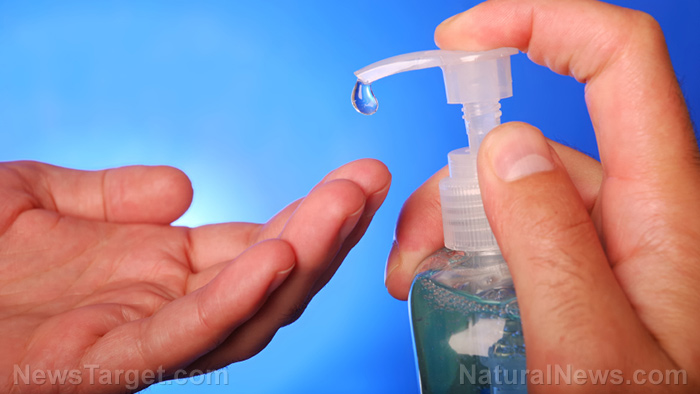Antibacterial soaps found USELESS at killing germs and cause harmful mutations (while posing a health risk to pregnant women and babies)
07/05/2017 / By Lance D Johnson

The over-used antibacterial chemicals in soaps, toothpaste, and everyday household items aren’t stopping harmful bacteria as advertised. These synthetic bactericides are causing harmful bacteria to mutate and develop resistant traits, making them more infectious, claims a new report.
Antibacterial soaps containing triclosan, triclocarban, and 19 other bactericides are useless for killing germs because these chemicals cause infectious bacteria to take on new traits so they can survive and dominate their environment. On top of all this, experts warn that these chemicals are disrupting the hormones of pregnant women and are harming babies at crucial development stages.
A report authored by 200 different scientists has claimed that these antibacterial chemicals are doing “more harm than good.” The modern day obsession with “killing bacteria” is creating hostile environments that suppress the natural environment of friendly bacteria. These antibacterial chemicals are essentially weaponizing bacteria against humans, encouraging the spread of infectious disease into the already deteriorated, undernourished cellular environments of humans.
Triclosan and antibacterial chemicals cause severe hormone disruption
Experts, such as the FDA’s Director of the Center for Evaluation and Research, now recommend just plain soap and hot water for cleaning up. Chemicals such as triclosan alter hormone activity in the body, which negatively impacts a child’s development, a women’s menstrual cycle, or a mom’s ability to produce quality breast milk. Rolf Halden, professor of engineering at Arizona State University, said: “Environmental and human exposures to triclosan and triclocarban are widespread, affecting pregnant women, developing fetuses, and breast-feeding babies.” Hormone disruption can lead to birth defects, miscarriage, and cancer. When triclosan degrades in the presence of UV radiation and chlorine water, it forms toxic dioxin compounds that persist in the water supply, which are linked to birth defects and cancer.
The power of the elements: Discover Colloidal Silver Mouthwash with quality, natural ingredients like Sangre de Drago sap, black walnut hulls, menthol crystals and more. Zero artificial sweeteners, colors or alcohol. Learn more at the Health Ranger Store and help support this news site.
Dr. Barbara Sattler, environmental health professor at the University of San Francisco, said: “People think antimicrobial hand soaps offer better protection against illness, but generally, antimicrobial soaps perform no better than plain soap and water.” Dr. Janet Woodcock of the FDA says that these antibacterial ingredients are doing more harm over the long term. These antibacterial chemicals act on bacteria in similar ways as antibiotics, exciting resistant traits that are hard to treat.
The US banned triclosan from soap in 2016, but substitute chemicals are expected to pose similar problems. “I was happy that the FDA finally acted to remove these chemicals from soaps,” said Dr. Arlene Blum, executive director of the Green Science Policy Institute. “But I was dismayed to discover at my local drugstore that most products now contain substitutes that may be worse,” she continued. It doesn’t help that these chemicals are pervasive and found in all sorts of products, including food storage containers, school supplies, paints, exercise mats, electronics, kitchenware, flooring, clothes, home textiles, and countertops.
Methods of prevention that don’t readily cause bacterial resistance include essential oils, raw honey, and silver
Natural antimicrobial compounds that are a part of plant’s makeup, are designed to coexist with bacteria in the environment. These natural compounds are more effective at holding harmful bacteria accountable because these compounds do not typically destroy friendly microbe activity. Instead, these natural compounds evolve alongside bacteria to protect the plants and retain balance in nature. If they are used wisely, natural antimicrobial compounds from plants are more effective for restoring the balance of microbial environments, allowing human cells the ability to adapt in the face of evolving pathogens.
This is why essential oils from plants are gaining popularity for helping people prevent and heal from infections. Similarly, raw honey, containing multiple antimicrobial properties from plants, is effective for restoring depleted cellular environments. Other antimicrobial actions are found in the element silver. The natural properties of a silver atom consistently break down harmful bacteria because a silver atom readily binds to bacteria cells and absorbs through their cell wall. Silver is designed in a way to kill harmful bacteria because it disrupts the bacteria cell’s metabolic functions without harming human cells.
Public health will improve only if individuals and the health care system get back to basics and integrate more natural medicines into practice. (RELATED: For more on natural healing, visit Healing.News)
Sources:
Tagged Under: antibacterial soaps, Colloidal Silver, liquid soap, microbial resistance, Personal care products, triclosan




















